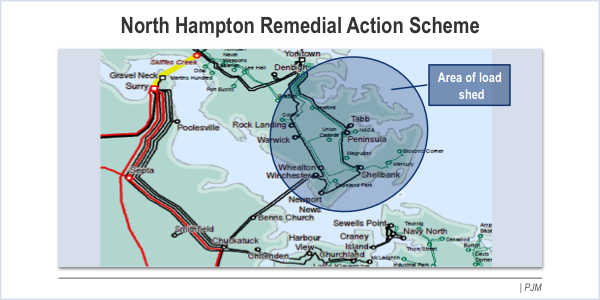By Rory D. Sweeney
VALLEY FORGE, Pa. — When Dominion Resources argued that failing to build a 500-kV line across the James River could result in blackouts, opponents of the plan didn’t believe it.
It turns out the company wasn’t bluffing.
Ronnie Bailey, a transmission planner for Dominion, presented the company’s alternative plan at PJM committee meetings this week, saying that the closure of its two coal-fired Yorktown plants in April will create a “long list” of N-1-1 contingencies that could result in voltage collapse and thermal overloads on the Virginia Peninsula.
An N-1-1 contingency represents the consecutive loss of two elements in a power system but with intervening time for operator adjustments.
The plan — the North Hampton remedial action scheme (RAS) — would be armed at PJM’s discretion. If the RTO detects the loss of certain facilities, it would trip the remaining feeds to the Yorktown area and drop service to approximately 150,000 customers, preventing voltage collapse. Rotating outages would follow until the facilities are repaired. Bailey confirmed the RAS has been approved by the SERC Reliability Corporation.
The Surry-Skiffes Creek line was proposed to maintain grid reliability on Virginia’s Lower Peninsula after Dominion shutters the Yorktown units. Increased environmental regulations have made the units impractical to run, and the isolated peninsula has few other power stations. With the local load projected to grow 8% by 2020, Dominion saw increasing the area’s connection to the grid as the only viable solution.
The project has attracted opponents, who are concerned that the transmission line would ruin the view at Jamestown and other historic sites nearby and believe the blackout warning is a scare tactic. A study conducted on behalf of the National Parks Conservation Association concluded that Dominion overestimated projected power growth and called for consideration of other alternatives, including underwater lines and converting the Yorktown plants to natural gas.
Approved by the PJM Board of Managers in 2012, the transmission project remains stalled pending permit approval from the U.S. Army Corps of Engineers. Bailey estimated that construction of the line would take at least a year after all permits are approved.
At a Jan. 11 Market Implementation Committee meeting, PJM Independent Market Monitor Joe Bowring asked Bailey if he was “100% certain” the Yorktown units would close. Bailey would only say that they’re required to close by law.
The region is home to numerous large electricity customers, including Newport News Shipbuilding, Joint Base Langley-Eustis, the Yorktown Naval Weapons Station, NASA, Historic Jamestowne, Colonial Williamsburg and the College of William and Mary.
Bailey assured the committee that the RAS “is only a stopgap measure,” noting that PJM’s regulations require those schemes to be temporary responses.




